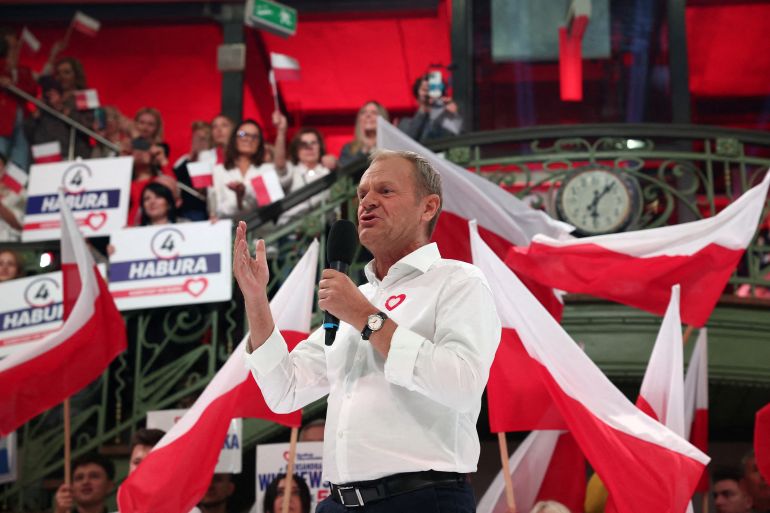‘Ideologically anti-populist’: Poland votes for a new future
Donald Tusk, former prime minister and top EU official, is set to lead a new coalition after eight years of populist rule.

Warsaw, Poland – Poland’s opposition, which has emerged as a winner of Sunday’s parliamentary election, will firstly focus on trying to unite a country that is deeply divided after eight years of nationalist rule.
Its success will be measured by its ability to reconcile the conflicting views and expectations of its constituent parts, analysts said.
Keep reading
list of 2 itemsTusk celebrates potential win over ruling nationalists in Poland election
Donald Tusk, once Poland’s prime minister and president of the European Council, looks set to take on the task of forming the new government, as the coalition he leads, which includes his liberal Civic Coalition, the Christian Democratic and economically liberal Third Way, and the left-leaning New Left, scored more than 53 percent of the vote.
The election saw the highest turnout since the fall of Communism.
The right-wing populist Law and Justice (PiS), which had hoped to form a government for the unprecedented third time in a row amid a highly divisive campaign, won the election with more than 35 percent of the vote, but is unlikely to be able to form a coalition and build a majority.
Currently, there are no parties or groups in the new parliament that would be willing to support PiS’s march to victory.
Poland’s pro-EU future?
Once the opposition government is sworn in, the main foreign policy task for Tusk and his allies will be to improve the relations between Poland and the European Union, which have deteriorated over Poland’s rule of law record.
“What all the parties that will form the future government have in common is this attachment to the European Union and European values,” Kastor Kuzelewski, a political analyst with the Polityka Insight think tank, told Al Jazeera.
“They are made up of politicians with very different views, but all of them are ideologically anti-populist and anti-nationalist, so there is a common minimum which is a negative minimum, an anti-PiS minimum.”
Before the election, Tusk promised that if his party won, on his first day as prime minister he would unblock almost 36 billion euros ($38bn) in EU funds that Brussels has been withholding from Poland due to conflict over judicial independence.
While the EU and Poland have agreed on a series of milestones that Warsaw would have to meet to release the funds, none of them has been met so far.
Fulfilling this promise in one day does not seem plausible, but releasing the funds will be a test for Tusk’s effectiveness as a politician.
At the same time, restoring judicial independence will allow him to reverse some of the decisions made during PiS rule with which his voters most disagreed, including the almost full abortion ban.
The new coalition will also look at dismantling a complex media ecosystem. Public broadcasters and a network of state-controlled papers have reproduced the government’s narrative and publishing materials, allegedly at the state’s request.
“This is a fundamental issue because everyone sees that there is a problem with public television in Poland and everyone can experience it. Anyone who turns on the state-owned TVP Info can see that it is simply a Law and Justice game, a proper propaganda. But dismantling it may prove easier said than done,” Kuzelewski told Al Jazeera.
At the same time, the new government is set to continue PiS’s course when it comes to relations with the United States and support for Ukraine fighting Russian aggression. The military buildup that PiS has begun will likely continue, too.
The real challenge, however, awaits the new government further down the line, when ideological issues and concrete policy proposals will land on the table.
These include questions of access to abortion, economic policy and social programmes, to name a few.
Parts of the coalition including the New Left support unlimited access to abortion until the 22nd week of pregnancy, a proposition that the conservative Christian Democrats from the Third Way party might not be willing to support.
Similarly, one of Third Way’s leaders, Szymon Holownia, announced yesterday the end of “government handouts”, a reference to PiS’s lavish social spending.
This, however, stands in harsh contrast to the values and principles of the New Left, which has been vocal about fighting inequalities and increasing social security.
For both the Third Way and the New Left – although not for some of their constitutive parts – this will be the first term in Parliament, and it remains to be seen how they will interact with each other and whether they are eager to compromise on some of their fundamental proposals.
“For years we haven’t had such a diverse coalition government in Poland, in which not only interests clash, but also the vision on the state and society,” Kuzelewski said.
“After eight years, there is a lot to fix that all the parties agree with. The problem will arise once these groups will have to form constructive policies.”